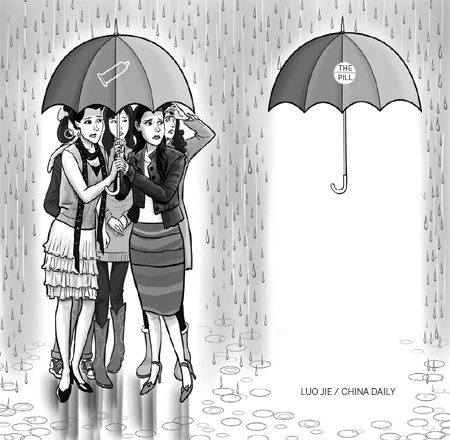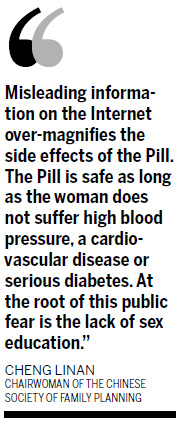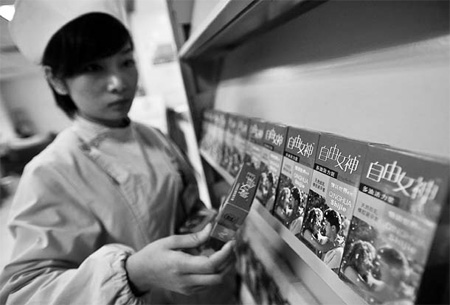China
Misconceptions about contraception
By Jiang Xueqing (China Daily)
Updated: 2010-10-26 07:56
 |
Large Medium Small |
|
A Beijing pharmacy employee displays the Pill, and its packaging, on Sunday. Feng Yongbin / China Daily |
Fifty years after introduction, the Pill has yet to make a mark. Jiang Xueqing in Beijing reports.
Two weeks after getting an exciting new job with a global business group, Lin Yanping discovered she was pregnant. For a woman already juggling a career in public relations with being a mother to her 4-year-old son, the news was far from welcome.
Although the 30-year-old admitted she was not using any form of contraception, she felt certain her long-trusted system of "calculating when it is safe" would protect her.
She was wrong, and doctors quickly pointed out that menstrual cycles can be greatly affected at times of stress - such as the kind caused by starting a new job.
Lin had an abortion, blaming the episode on "bad luck". Yet, even today she prefers to trust in her calculations than in the combined oral contraceptive pill, commonly referred to as the Pill.
In the 50 years since the United States' Food and Drug Administration approved its release, the Pill has become one of the most popular forms of contraception in the West. However, medical experts say it has yet to make its mark in China, where the public still holds many widespread misconceptions.
"Taking the Pill is against nature and I'm afraid it will harm my health," said Lin. "Besides, the Pill has to be taken every day. It's too troublesome and I'd definitely forget."
Lin's attitude is not uncommon. According to a 2009 online survey by the China Population Communication Center, 67 percent of the 8,501 respondents worry about the Pill's side effects.
Other concerns included the hassle of remembering to take it every day (17 percent) and its effectiveness (14 percent).
As a result, just 1.7 percent of all married Chinese women aged 15 to 49 who use contraception take the Pill, said Wu Shangchun, a research fellow at the National Research Institute for Family Planning. The number stands in sharp contrast to the 41 percent reported in the Netherlands, 29 percent in Britain and 18 percent in the US.
Chinese instead rely on other contraceptive methods, such as condoms, sterilization and intrauterine devices (IUD), which are placed in the uterus.
The annual Health Statistics Yearbook shows almost 8 million women received IUDs in 2008, with another 1.8 million undergoing vasoligation or tubal ligation operations to have their "tubes tied".
Effective measures
Central authorities promoted IUD and sterilization in the 1980s and 1990s as the measures can be effective for years, making them easy for family planning officials to monitor.
Only in the past decade have more people turned to private and independent measures like condoms and the Pill. About 10 percent of married couples aged 15 to 49 used condoms in 2006, according to the National Population and Family Planning Commission.
However, although more popular than the Pill, condoms are still not as reliable in terms of protecting against unplanned pregnancy.
Clinical trials on 100 women over a 12-month period have shown that an average of two to 12 accidental pregnancies occur with the use of condoms. That number drops to 0.1 to one with the Pill.
However, the vast majority in China is still not aware of such information.
"Chinese women in general have many misconceptions about hormones and the Pill," said Cheng Linan, chairwoman of the Chinese Society of Family Planning at the Chinese Medical Association.
A poll of 1,300 women and 233 men in seven major Chinese cities between 2003 and 2005 found that a large number think taking the Pill every day will lead to infertility, with many also complaining it leads to weight gain and endocrine disorders. Some even feared it could cause cancer.
"All medicines have toxicity to some degree," argued Hu Jing, a 27-year-old editor at a weekly Chinese-language magazine in Beijing. She said her boyfriend disapproves of her taking the Pill due to "the health risks".
Such misunderstandings not only prevail among the public but also among medical professionals.
When Hu was in college, a professor of medical science told her during a sex education lecture that the Pill causes minor depression. Research by the Shanghai Institute of Family Planning Technical Instruction also found less than 3 percent of obstetricians in Shanghai use the contraceptive.
The negativity is also reinforced by myriad horror stories on the Internet, such as the one posted by a female netizen under the name "I Was Made A Clown" on Tianya, a popular forum.
The writer describes how she lost interest in sex after more than a year of taking the Pill and became ill tempered. In January 2009, four years after starting the contraceptive, she stopped and almost immediately experienced menopause, with doctors diagnosing polycystic ovary syndrome - one of the leading causes of female infertility.
The post, which first appeared on June 15, has so far received 473,848 views and 1,815 comments. Many comments center on similar concerns, with some even calling for readers to re-post the story "to warn others".
"Misleading information on the Internet over-magnifies the side effects of the Pill," said Cheng with the Chinese Society of Family Planning. "The Pill is safe as long as the woman does not suffer high blood pressure, a cardiovascular disease or serious diabetes.
"At the root of this public fear is the lack of sex education," she added.
Harsh lessons
While the Chinese have become more open about sexual behavior, many still have little knowledge about reproductive health. This has led to many young people regularly using emergency contraception, otherwise known as the "morning after pill", as a form of contraception.
Analysis by IMS Health, an international consultancy, shows over-the-counter sales for oral contraceptives hit 444 million yuan in 22 major Chinese cities in 2009. The morning after pill accounts for roughly 70 percent of that market, according to Huang Dongliang, marketing director for Beijing Zizhu Pharmaceuticals.
"We sell at least five boxes of (the morning after pill) on a typical day and more than a dozen on a busy day," said a saleswoman at the Wanmin Yangguang drugstore in Beijing's Chaoyang district.
The majority of buyers, she estimated, are 20 to 25 years old.
A post-graduate student in Beijing who did not want to be identified told China Daily she takes the morning after pill every time she visits her boyfriend in another city, which is more than 10 times a year. Worried about the possible damage this could do, she e-mailed a doctor, who warned her not to replace the Pill with a "patch-up remedy". The medic later posted his suggestions on Tianya.
Experts agree that a lack of sex education is preventing many people from making the right choice.
The population center's 2009 Web survey found that 49 percent of respondents still think the morning after pill is the most effective contraceptive for preventing pregnancy.
Although listed as part of the official curriculum by the Ministry of Education, sex education in schools is limited. Teachers mainly focus on the basic facts, such as secondary sex characters and the science of reproduction, rather than talking openly about sensitive topics like contraception and sexually transmitted diseases.
Hu Zhen, a professor at Chengdu University's teaching college, launched a selective course on sex education in March that covered topics like sex culture, science and psychology but overlooked information on contraception.
In defense of the course she designed, Hu said students already learn a lot about contraception through the Internet.
However, research in 2007 by Tongji Medical College of Huazhong University of Science & Technology showed that, out of 80,000 students from 49 universities nationwide, at least 90 percent believe it necessary for colleges to teach about contraception.
Sexual liberation
The high demand for knowledge comes as part of a sexual revolution that sexologists say has been occurring in China since the late 1980s.
Pan Suiming, director of Renmin University of China's institute for research on sexuality and gender, said 51 percent of Chinese singletons had sex before marriage in 2006, showing an average increase of 7.9 percent year-on-year since 2000.
"With contraception and abortions justified, legalized and promoted by the government, people are relieved from the concerns of premarital pregnancy," he said.
A 2009 study by Peking University on the reproductive health of Chinese youngsters also found that 22 percent of the country's 164 million single people aged 15 to 24 had sex before marriage and more than 20 percent had an unplanned pregnancy, of which 91 percent resulted in abortions.
As China's sex education has failed to keep up with sexual precocity, the age of women now having abortions has fallen dramatically.
According to a report in September in the People's Daily, it is now common to find girls as young as 11 undergoing the procedure.
Chen Yiyun, an expert with the China Sexology Association, reportedly visited a private clinic in Nanning, capital of the Guangxi Zhuang autonomous region, where the youngest patient was only 9 years old.
Green Apple, the Beijing-based hotline that offers advice to students, receives more than 100 calls a week about pregnancy at the beginning of each school semester. Staff revealed that one caller was a 14-year-old girl who had to have her womb removed due to the damage caused by three abortions.
Statistics from the Ministry of Health show that more than 9 million abortions were performed in China in 2008, compared to 7.6 million in 2007.
Of all the patients, roughly half were women without children, said Wu Shangchun at the National Research Institute for Family Planning.
"As these women may have children in the future, they should be very careful about the severe harm abortions cause to reproductive health," she said. "By taking the Pill, they are protected from unplanned pregnancy and abortions."
|
A nurse puts free condoms on a shelf at Tongji Medical College's reproductive medical center in Wuhan, capital of Hubei province. Surveys show that Chinese couples prefer condoms to the Pill. Zhou Chao / for China Daily |




